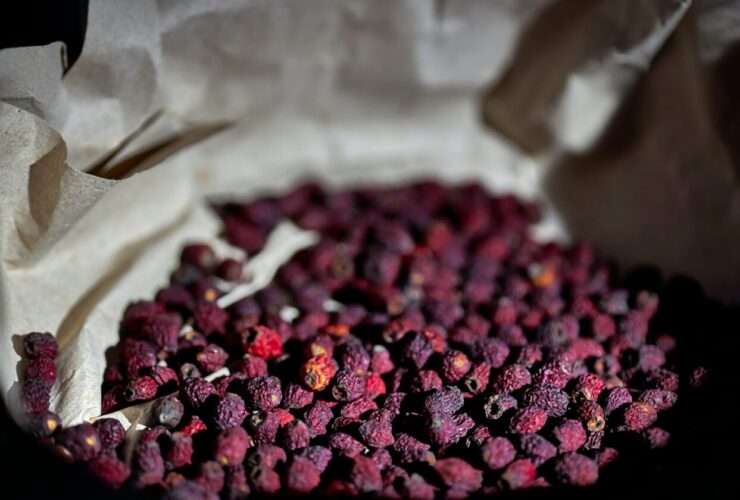Introduction
Ketogenic diets have been trendy recently due to their efficacy in helping people lose weight and other health advantages. Making educated food choices is becoming increasingly important as more people delve into the details of this nutritional strategy. A frequently asked question by people on a ketogenic diet is whether bell peppers are appropriate for them. So, are bell peppers acceptable for keto? Knowing how many carbohydrates bell peppers contain is essential for those following a ketogenic diet since it affects their ability to stay in ketosis and meet their health goals.
Bell peppers are a mainstay in many nutritional and culinary traditions because of their vivid colors and crisp texture. However, bell pepper carbohydrate content needs more research for individuals following a ketogenic diet. Bell peppers may include some carbohydrates, but they also have a wide range of vital nutrients and chemicals that are good for you. Especially green bell peppers are an excellent choice for keto because they have fewer carbohydrates than their red and yellow siblings. Mindfully adding bell peppers to meals allows people to reap the nutritional advantages while controlling their carb consumption to maintain ketosis.
Knowing how to incorporate bell peppers into your meal plan might help people better navigate the intricacies of the ketogenic diet. There are many methods to take advantage of the nutritional value of bell peppers while adhering to the ketogenic diet, from choosing the appropriate color type to incorporating them into creative meals. Bell peppers provide taste and adaptability that align with the objectives of a ketogenic diet, whether they are used as a crunchy snack, a vibrant addition to salads, or a tasty ingredient in savory meals. By accepting the distinctive qualities of bell peppers and carefully incorporating them into their diet, people can maximize their keto experience while enjoying the deliciousness of this colorful vegetable.
Exploring the Nutritional Value of Bell Peppers

When exploring the world of ketogenic diets, it is critical to comprehend the nutritional makeup of meals. Bell peppers are loaded with nutrients that align with the keto diet, thanks to their vivid colors and crunchy textures. These adaptable veggies provide a balanced macronutrient composition, including lipids, proteins, and carbohydrates. But bell peppers are unique because they have comparatively few carbohydrates, making them a great option for anyone on a ketogenic diet. Bell peppers are an excellent way to stay in ketosis while enjoying essential nutrients.
Bell peppers are notable for having a high fiber content, which is essential for satiety and digestive health. Fiber helps to maintain gut health, encourage regular bowel movements, and reduce the likelihood of constipation. Additionally, fiber helps people feel satisfied and full after eating, making it more straightforward to stick to their ketogenic diet. Bell peppers are an excellent addition to keto-friendly meals because they are high in dietary fiber and offer various culinary options and nutritional advantages.
Besides their high fiber content and macronutrient composition, bell peppers are an excellent low-calorie choice for individuals trying to control their weight. Bell peppers give flavor and visual appeal to food without adding many calories because of their vivid hues and inherent sweetness. Therefore, they are the perfect option for cutting calories without sacrificing flavorful, nourishing meals. People can balance taste, nutrition, and weight control by adding bell peppers to their keto meal plans, allowing these vibrant veggies to reach their full potential in their diets.
The Carb Counts of Different Bell Pepper Varieties

Knowing what foods include regarding carbohydrates is crucial when starting a ketogenic diet, and bell peppers are no exception. These vibrant vegetables are available in a variety of colors, and each has a distinct flavor and nutritional makeup. Comprehending the carb counts of various bell pepper cultivars is critical to making educated decisions. Green bell peppers are the least carbohydrate-dense of their multicolored siblings, even though they are crisp and slightly bitter. However, red and yellow bell peppers typically have more excellent carbohydrate content because of their vivid colors and sweeter flavor. By recognizing these variations, people may modify their keto meal plans to incorporate bell peppers that satisfy their nutritional needs while still tasting delicious and full of nutrients.
The idea of net carbohydrates is king when it comes to ketogenic diets. Because fiber is not entirely absorbed and processed by the body, net carbohydrates are the total carbohydrates, less the fiber content. It’s essential to consider bell peppers’ net carb counts when determining whether or not they are suitable for a keto diet. All bell pepper varieties include some carbohydrates, but when eaten in moderation, their fiber content somewhat counters these carbs, making them an acceptable option for keto fans. People can sustain ketosis and support their health and wellness objectives by adding bell peppers to their diets and enjoying their nutritional advantages while adhering to their carbohydrate limits.
Bell peppers are a vegetable that is naturally sweet and colorful, but they are sometimes mistaken for high-carb foods, which confuses people who follow the ketogenic diet. With the proper knowledge, people can dispel these myths and utilize bell peppers in their keto meal plans with confidence. People can easily enjoy bell peppers’ nutritional value and culinary flexibility while following a ketogenic diet if they know the carb counts of various bell peppers and the idea of net carbohydrates.
Are Bell Peppers Keto Friendly?

Quick Answer: Yes, bell peppers can be included in a ketogenic diet, but moderation is vital due to their carbohydrate content.
Even though bell peppers are high in carbohydrates, they can be considered keto-friendly if included in your diet with consideration. They greatly complement a ketogenic diet plan because of their adaptability and high nutrient content. Although bell peppers may contain some carbohydrates, they also provide a wealth of antioxidants, vitamins, and minerals that promote general health and well-being. It’s important to think of bell peppers as an essential part of a balanced keto diet, offering necessary nutrients and supporting the maintenance of ketosis rather than just as a source of carbohydrates.
Bell peppers contain carbohydrates, essential information for anyone on a ketogenic diet. Bell peppers include natural sugars, but they also have fiber, which can lessen the effect of carbohydrates on blood sugar levels. The color and maturity of bell peppers affect their net carbohydrate content. Green bell peppers, for instance, usually have fewer carbs than their red or yellow counterparts.
Bell peppers can be used in various ways in a ketogenic diet. Bell peppers may improve the flavor and nutritional profile of many different foods. They can be used to add color and crunch to salads and stir-fries or to load them full of keto-friendly components for a filling dinner. Their inherent sweetness can also be used to create keto-friendly sweets or snacks, providing a delightful treat without sacrificing your dietary objectives.
When using bell peppers in your meals, as with any other food on the ketogenic diet, moderation and thoughtful consumption are essential. Although they offer a variety of vital nutrients, excessive ingestion may affect ketosis in certain people. Consequently, to ensure that bell peppers fit into your daily macronutrient objectives, it’s critical to keep an eye on portion sizes and measure your intake of carbohydrates. People can reap the benefits of this vibrant produce while adhering to a ketogenic diet by embracing the keto-friendly qualities of bell peppers and experimenting with creative recipes.
Practical Tips for Integration
When included in a ketogenic diet, Bell peppers can enhance your meals’ flavor and nutritional content. There are many inventive ways to enjoy bell peppers while adhering to your keto macros, from colorful salads to filling stir-fries and tasty stuffed peppers. Bell peppers give your food a range of colors and textures, improving the meal’s appearance and flavor. Bell peppers are an excellent complement to any keto meal plan because of their versatility, allowing you to enjoy them either raw and crunchy or soft and roasted.
Bell peppers should always be included in keto dishes, but moderation and amount management are essential. Even while bell peppers have fewer net carbohydrates than other vegetables, their carbohydrate content can increase significantly. You may use bell peppers’ nutritional advantages without going over your daily carbohydrate allowance if you are careful about the portion sizes you choose and balance them with other low-carb items. Furthermore, adding bell peppers to batch-cooked meals at meal prep guarantees that you’ll have easy access to this nutrient-dense food all week long.
In conclusion, eating bell peppers in moderation and carefully considering how to include them in your meals can benefit your ketogenic diet. By embracing their adaptability and nutritional advantages, you can enjoy tasty and fulfilling ketogenic cooking while improving your cooking skills. Whether new to low-carb cooking or a seasoned keto aficionado, experimenting with bell peppers gives you a world of delicious and healthful culinary options.
FAQ about Bell Peppers and Keto:
Q: What color bell pepper is best for keto?
A: Green bell peppers are the most keto-friendly option, containing only 2.9g of net carbs per 100g. Opting for green peppers can help reduce carbs while enjoying their nutritional benefits and affordability.
Q: Are bell peppers high in carbs?
A: While bell peppers contain carbohydrates, their net carb content varies depending on the color and ripeness. Green bell peppers tend to be lower in carbs than red or yellow ones, making them a better option for those following a keto diet.
Q: Is pepper allowed on keto?
A: Yes, pepper is generally allowed on a keto diet as it contains minimal carbs and can add flavor to your meals without significantly impacting your carb intake. It’s a versatile seasoning that can enhance the taste of keto-friendly dishes.
Q: Can you eat carrots on keto?
A: Carrots are higher in carbohydrates than other non-starchy vegetables, so they should be consumed in moderation on a keto diet. While small amounts of carrots can fit your carb limit, it’s essential to be mindful of portion sizes.
Q: Are cucumbers keto?
A: Cucumbers are keto-friendly, as they are low in carbs and calories. They make a refreshing addition to salads and snacks while providing hydration and essential nutrients.
Q: Is tomato keto-friendly?
A: Tomatoes can be included in moderation on a keto diet, as they contain natural sugars that contribute to their carb content. Opt for smaller portions of tomatoes or use them sparingly in recipes to stay within your carb limit.
Q: What are the top 10 keto foods?
A: The top 10 keto foods include meat, fish, eggs, cheese, avocados, nuts and seeds, low-carb vegetables like leafy greens, cauliflower, and broccoli, healthy oils like olive oil and coconut oil, and low-carb dairy products like Greek yogurt and cottage cheese.
Q: Is onion keto-friendly?
A: Onions contain moderate amounts of carbs, so they should be consumed in small quantities on a keto diet. Opt for green onions or use onions as a flavoring agent rather than a primary ingredient to keep your carb intake in check.
Q: Do peppers break ketosis?
A: Peppers can be included in a keto diet without breaking ketosis, especially if consumed in moderation and as part of a well-balanced meal plan. Be mindful of your overall carb intake and choose lower-carb pepper varieties like green peppers.
Q: What vegetables are not keto-friendly?
A: Starchy vegetables like potatoes, sweet potatoes, and corn are not keto-friendly due to their high carb content. Additionally, high-sugar vegetables like peas and carrots should be consumed in moderation on a keto diet.
Q: Is garlic good for keto?
A: Yes, garlic is low in carbs and can add flavor to keto-friendly recipes. It’s a versatile ingredient used in various dishes without significantly impacting your carb intake.
Q: Is hummus good for keto?
A: Traditional hummus made from chickpeas is relatively high in carbs and may not be suitable for a keto diet. However, you can enjoy keto-friendly alternatives like avocado or eggplant-based dips.
Q: Is cheese good for keto?
A: Cheese is a popular choice on a keto diet due to its high fat and moderate protein content. It’s a convenient and delicious source of nutrients that can be enjoyed in moderation as part of a keto meal plan.
Conclusion
In summary, bell peppers are a ketogenic vegetable; green bell peppers are the best choice because they include fewer carbohydrates than red or yellow bell peppers. These vibrant vegetables provide keto meals taste and nutrition without drastically affecting your carbohydrate intake. Bell peppers are full of vitamins, minerals, and antioxidants, so adding them to your keto meal plans will improve the flavor and diversity of your meals and your health.
In their keto cooking ventures, we urge readers to discover the gastronomic diversity of bell peppers. Bell peppers may improve your meals’ flavor and nutritional content, whether you eat them raw in salads, sautéed in stir-fries, or roasted as a tasty side dish. Try various cooking techniques and flavor combinations to find novel and exciting ways to include bell peppers in your ketogenic diet.
It’s essential to remember that while bell peppers might be a beneficial addition to a ketogenic diet, every person has different dietary requirements and preferences. Consider speaking with a nutritionist or medical expert to customize your diet to meet your unique needs and health objectives. You may relish the flavor of bell peppers in your meals and reap the benefits of a ketogenic diet with careful planning and educated decisions.
Reference:
(1)Do You Have to Count Calories on a Keto Diet? – Livestrong
https://www.livestrong.com/article/323349-how-many-calories-should-i-eat-on-a-keto-diet/
(2)Bell Peppers 101: Nutrition Facts and Health Benefits
https://www.healthline.com/nutrition/foods/bell-peppers
(3)The Best Anti-Inflammatory Foods | TIME
https://time.com/5217972/anti-inflammatory-foods/
Was this helpful?

Joseph Emb, RDN
Founder of StyleVitally.com | Registered Dietitian & Wellness Advocate
What I Cover:
I’m passionate about connecting nutrition science and everyday wellness to help people live healthier, more vibrant lives. I write about evidence-based nutrition, mindful eating, sustainable lifestyles, and holistic well-being at StyleVitally.com.
My Background:
The University of Texas in Austin, where I earned my Dietetics diploma, laid the groundwork for my nutrition and health career. My training and hands-on experience taught me the science and art of using nutrition to enhance health and well-being.
Professional Journey:
I’m an RDN with lots of experience. I’ve helped people seeking tailored nutritional recommendations in clinical settings and community outreach programs. My constant learning and professional development ensure that my recommendations are always based on the latest evidence.
Ethical Commitment:
My practice prioritizes integrity. My content is transparent and objective, following the most significant ethical standards. I can give my audience unbiased advice because I’m not affiliated with food businesses or industry associations. I want to help people make informed health decisions that match their values and ambitions.
Join Me on the Wellness Journey:
Join me on the path to vitality and well-being, whether facing nutritional issues, seeking sustainable lifestyle changes, or simply wanting a better, happier you. We’ll discover how diet, mindfulness, and holistic well-being can maximize your potential.









